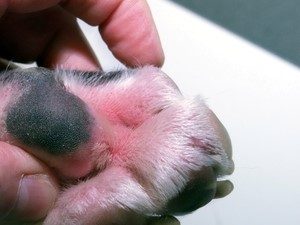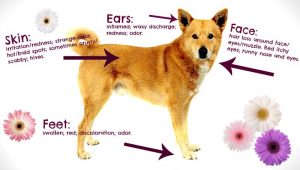Scruffy’s Constant Scratching
Is Scruffy’s scratching keeping you up all night? Is Scruffy licking his feet raw and scratching his ears relentlessly? While there are many causes of itchy skin in dogs, seasonal allergies are one of the main culprits during this time of year. Human allergies tend to show as itchy, watery eyes, or sneezing; however, dog allergies affect the skin, especially the feet, ears, and face.
Dogs can be allergic to numerous different sources, such as pollen, mold, dust, or grass. During the late summer to early fall time we have a significant increase in dogs suffering from red, irritated, and itchy skin. Licking the feet between the toes, scratching ears, or scooting their rear end on the ground can all be signs of seasonal allergies. Allergens can cause this irritation from contact, when a dog walks through the grass, or from inhaling the allergens themselves. Once these allergens have made contact they cause a large release of a substance called histamine that causes the red, itchy, inflamed skin throughout the body.
While some dogs can get through the allergy season with just an over-the-counter allergy medication, other dogs may need additional anti-inflammatory medications, such as a steroid, to get them through their roughest season. Please contact Dupont Veterinary Clinic (260-637-7676) for the appropriate dosing of an over-the-counter allergy medication for your pet, such as Benadryl or Zyrtec. Some dogs respond really well to the anti-histamine in these common allergy medications; however, sometimes the inflammation is too significant and a steroid would be prescribed instead to soothe the red and inflamed skin.
If a dog has been itching and licking his feet or legs for a prolonged period of time, it is possible for them to develop a secondary bacterial infection. Once the skin becomes irritated the natural skin barrier is broken down and bacteria that is normally found on the skin can start to cause an infection. In these cases, you need to see your veterinarian for a course of antibiotics to help get rid of the bacteria and allow the skin heal. Depending on how affected the skin is, your veterinarian may recommend an E-collar, or the cone of shame, to prevent continued licking and itching of the skin.
Dogs with seasonal allergies are more prone to ear infections as well, since the inside of the ear is lined with skin that can be affected by histamine release as well. Once the skin on the inside of the ear is irritated and inflamed, the bacteria that is found in the ear causes an infection. The ear is an excellent place for bacteria to proliferate since it is a dark, warm, and moist area, which bacteria love! If your dog is itching his ear constantly, it is important to bring him or her in to see your veterinarian to have an ear cytology performed. This ear cytology is when we take a cotton swab of the inner ear, stain it, and look at it under a microscope to see if the infection is caused by bacteria or yeast. Once we know what is growing in the ear and causing the infection, your veterinarian can choose the appropriate ear medication to treat the infection.
If your dog’s itching and scratching is keeping you up at night, contact your veterinarian at Dupont Veterinary Clinic to have your pet examined. Each pet is an individual and will need different treatments based on his or her clinical signs. We want to take care of your pet’s allergies so you and your fur-family can enjoy a relaxing end to the summer!
By Ashley Dawes, DVM






